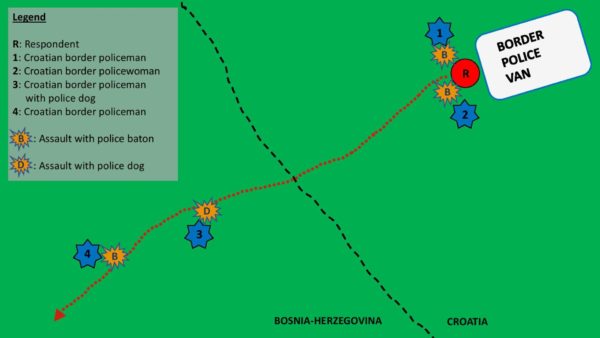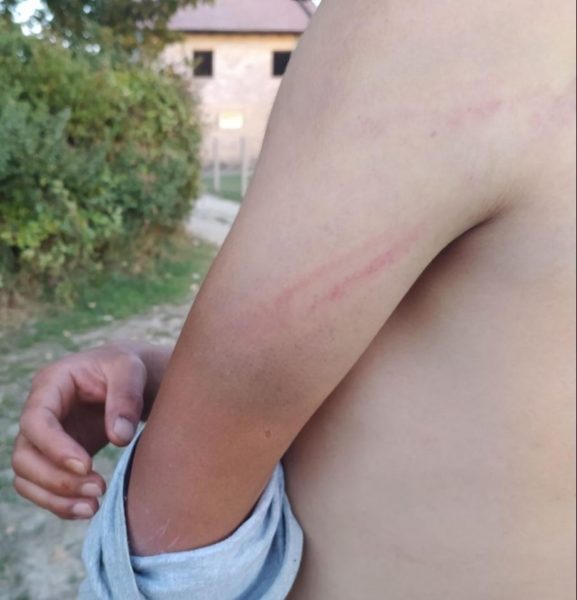The events of the following testimony lasted over a period of three days, beginning on the 7th of September in western Slovenia until the final pushback from Croatia to north-western Bosnia and Herzegovina on September 9th, 2021.
The initial transit group used to be a group of 4 men from Afghanistan, aged 24, 25, and 26 years including also a minor. This group was apprehended on the 7th of September at around 7:30 pm by 2 Slovenian policemen in a forested area close to the Slovenian town Rodik, around 5 kilometers away from the Slovenian-Italian border. The respondent, a 25-year-old man from Afghanistan, describes how they got approached by the 2 policemen who had their guns drawn and were shouting “Stop! Sit down!” in English to the group. The group members followed the orders. Then, 2 persons each got handcuffed together so that the group members were left in two pairs. The officers then ordered them to empty their pockets and store those belongings, including their phones, inside their backpacks. After about 30 minutes, another 4 Slovenian policemen arrived at the spot. The new police officers took over the handcuffed men and the 2 initial police officers left. The 4 officers escorted the transit group to the nearby street and made them enter the back of their police car. The respondent describes the car as a white police car. He describes that the 4 officers were sitting in the front together with the backpacks of the group, holding the members of the transit group in the separated back part of the vehicle. After approximately 40 minutes of driving, they arrived at a Slovenian police station.
At the police station, they were taken into a big cell, in which 2 more People on the Move were waiting already. The whereabouts of their backpacks were uncertain for the time they spent in the police station. After a few minutes in detention, some food was brought to the group. Access to water was possible via a sink in the toilet area that was installed in the arrest room.
After about 2 hours, each one of the 6 persons was brought one after the other into a separate room where a Farsi-speaking translator was present. The respondent explains that he assumes that the translator was initially from Iran. He describes that each interview lasted around 5 minutes and the only questions asked were “What is your name?“, “From which country are you?” and “From which province are you?“. If the interviewees would like to express an application for asylum in Slovenia was not asked by the translator, as the respondent recalls. Next, the fingerprints of their index fingers were taken and a document in Slovenian had to be signed, which, on inquiry, the translator reportedly explained as being about receiving food in the police station.
“Translator say ‘This paper just for food, not for other matter’. But [I] understand is not for food, this paper for deport.”
The respondent signed the paper, even though he did not really believe it was about food. He assumed it was instead for accepting the readmission to Croatia. Once the interview was over, the respective person was brought back to the arrest room, where they had to stay for the night. Even though each person had access to a thin blanket, they were exposed to low temperatures, since the ventilator kept running throughout the night.
On the following day, the 8th of September, the group got woken up around 12 pm midday and received breakfast. One hour later, the detained persons got taken, one after another, into a separate room in order to get tested for Covid-19. After they were brought back to the room. Another hour later, around 2 pm, they all received their negative Covid-19 results, and the initial transit group of 4 people was brought into a white police car. Two policemen sat in the front of the car, with the backpacks and belongings of the transit group. The drive lasted around 45 minutes and eventually transported the group to the ‘Logatec Asylum Center’ in Slovenia as the respondent describes.
Once arrived in the Asylum Center, the policeman handed over the transit group and their belongings to the security guards of the camp, who then searched the transit group and brought them to a vacant sleeping room of their own, with the backpacks outside of the room in front of the locked door. After one hour of waiting they were brought to a bathroom to take a shower. Once back in the room the 4th person of the group, the minor, was not there anymore. The respondent and the rest of the initial transit group have not been in touch with him since then but guessed they got separated because of his nonage. Later that day they received “one milk, one biscuit, one small water – finish” to their room, but eventually got each a plate of pasta for dinner later on. For the rest of the day and the upcoming night, they stayed inside the room.
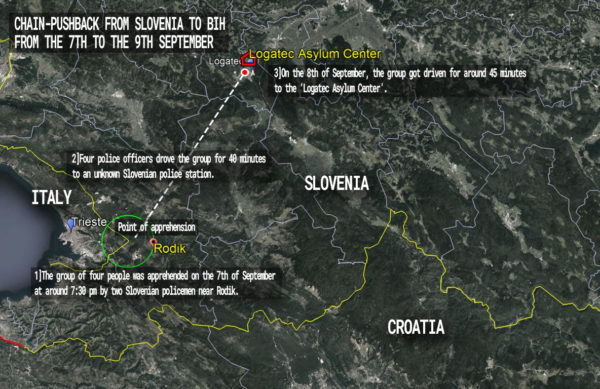
The next morning, 9th of September, 2 Slovenian police officers knocked on the door and brought the group together with their backpacks to a white police car. This was around 7 am. The officers drove the transit group (consisting of the three remaining persons) for about 1.5h to the Obrežje border crossing station on the border with Croatia. (coordinates: 45.845946, 15.694408) While waiting for 20 minutes for Croatian police to arrive, one of the Slovenian policemen involved in the pushback to Croatia told the group in English, that the Croatian police would bring them to Bosnia where they would then get back their backpacks and belongings, the respondent recalls.
Once the Croatian police arrived, they escorted the Slovenian police car with the transit group to a Croatian police station, which lasted only a few minutes as the respondent describes. Regarding the short distance of driving, it can be assumed that they were brought to the Croatian border police station at the other side of the Obrežje border crossing. The Slovenian officers ordered the transit group to get out of the car and handed them over to Croatian officers, who brought the transit group into the police station, together with their belongings. Once in the station, each person got searched on the body as well as the backpacks. The respondent describes that he witnessed how a Croatian officer took food and energy drinks out of their backpacks while searching them. In the following procedure photos of the faces of each member of the transit group were taken and they got told to sign a paper in Croatian, which they followed. A translator was not provided.
Afterward, 2 Croatian policemen brought the transit group into a white police van with a blue stripe on the side as the respondent describes. The backpacks were locked in a metal cage in the back of the car next to the group. The driving lasted around 30 minutes and eventually ended at a second police station in Croatia at around 10 am. Here the group was left alone in the car for a total of 3 hours until 7 further people on the move were brought into the back of the police van, which the respondent recalls as being 7 men from Pakistan.
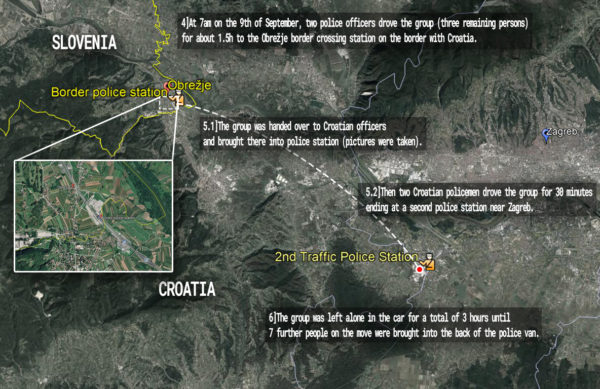
The group of 10 then got driven by 2 police officers and got escorted by a second white police car with 4 policemen inside. After driving for several hours, the van stopped on a small road in the forest. The doors opened and the group got told to get out of the car and into an already waiting white van, which the respondent describes as from Croatian border police, together with 2 Croatian border police officers – one man and one woman. Some of the present officers made gestures to move faster and slapped and pushed some members of the transit group. The backpacks were also handed over to the border police officers. This is the last time the group has seen their backpacks as the respondent remembers. With 2 border police officers in the front, they continued driving for about 20 minutes, until the car stopped again in a forest area, around 5 kilometers south-east of the Bosnian town Gradina.
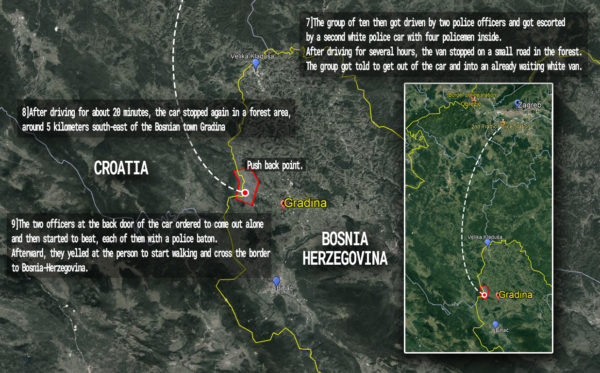
As the back doors opened, the female border police officer, who wore a black balaclava, and a male officer told the transit groups to take off their shoes, jackets, and jumpers. The respondent describes that each of the members of the transit groups then had to go through the following procedure: The two officers at the back door of the car ordered to come out alone and then started to beat, each of them with a police baton, several times on the upper body and legs. Afterward, they yelled at the person to start walking and cross the border to Bosnia-Herzegovina, pointing towards 2 other policemen. The respondent describes that he had the impression to have crossed the border and expected a Bosnian policeman waiting already, which eventually turned out to be another Croatian policeman. The first of them, a border police officer having a police dog on the leash, made the dog attack the approaching person from the transit groups. At last, another border police officer was involved, which the respondent describes that he grabbed him by the scruff of his neck and beat him eight times with a police baton on his arms, shoulders, and back. Meanwhile, the respondent could clearly see a Croatian flag on the upper arm of the uniform the officer was wearing as he explained it. Since all 10 people on the move had to go through this procedure, it lasted for around 20 minutes in total.
